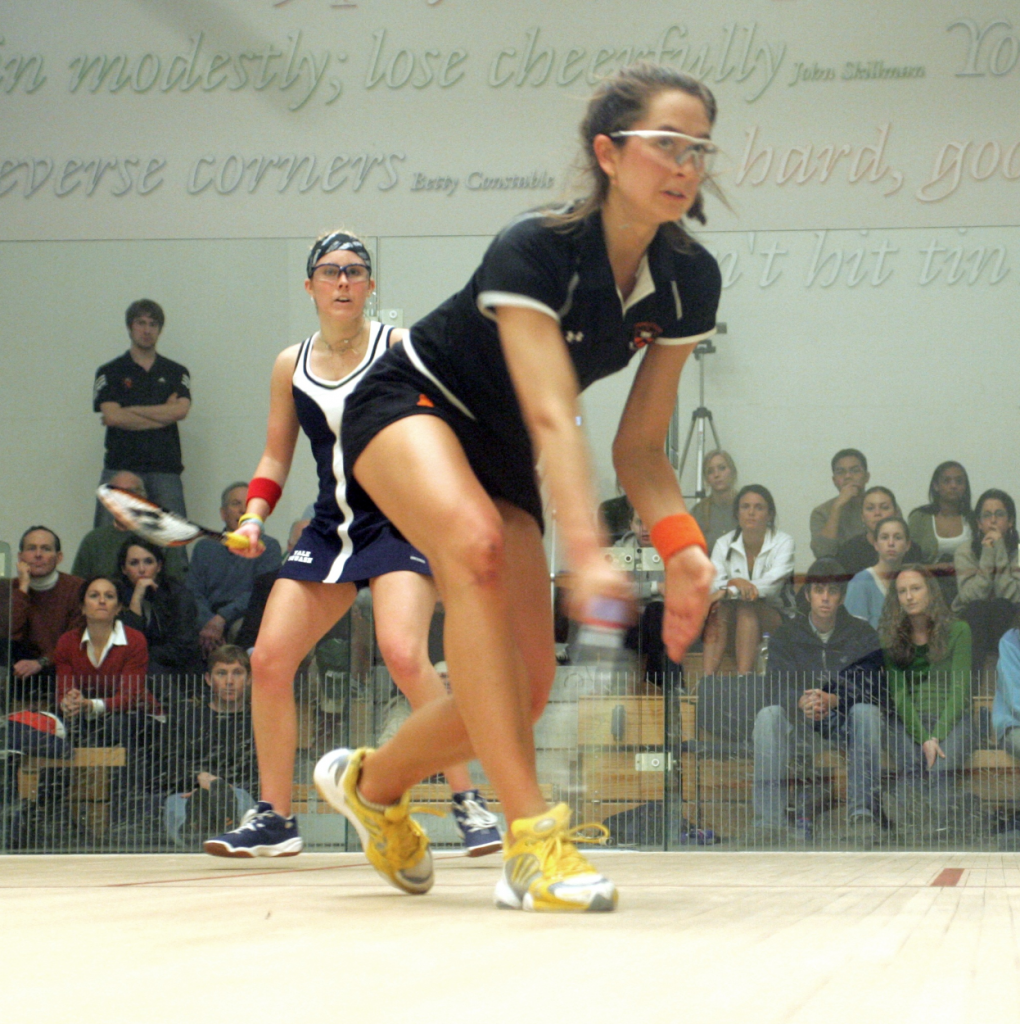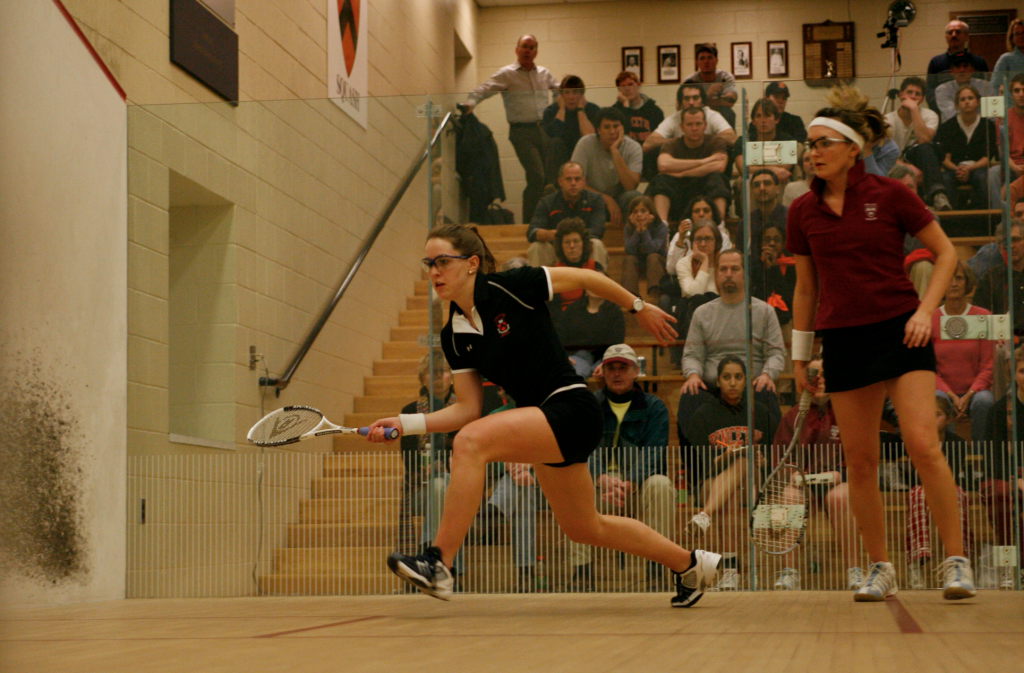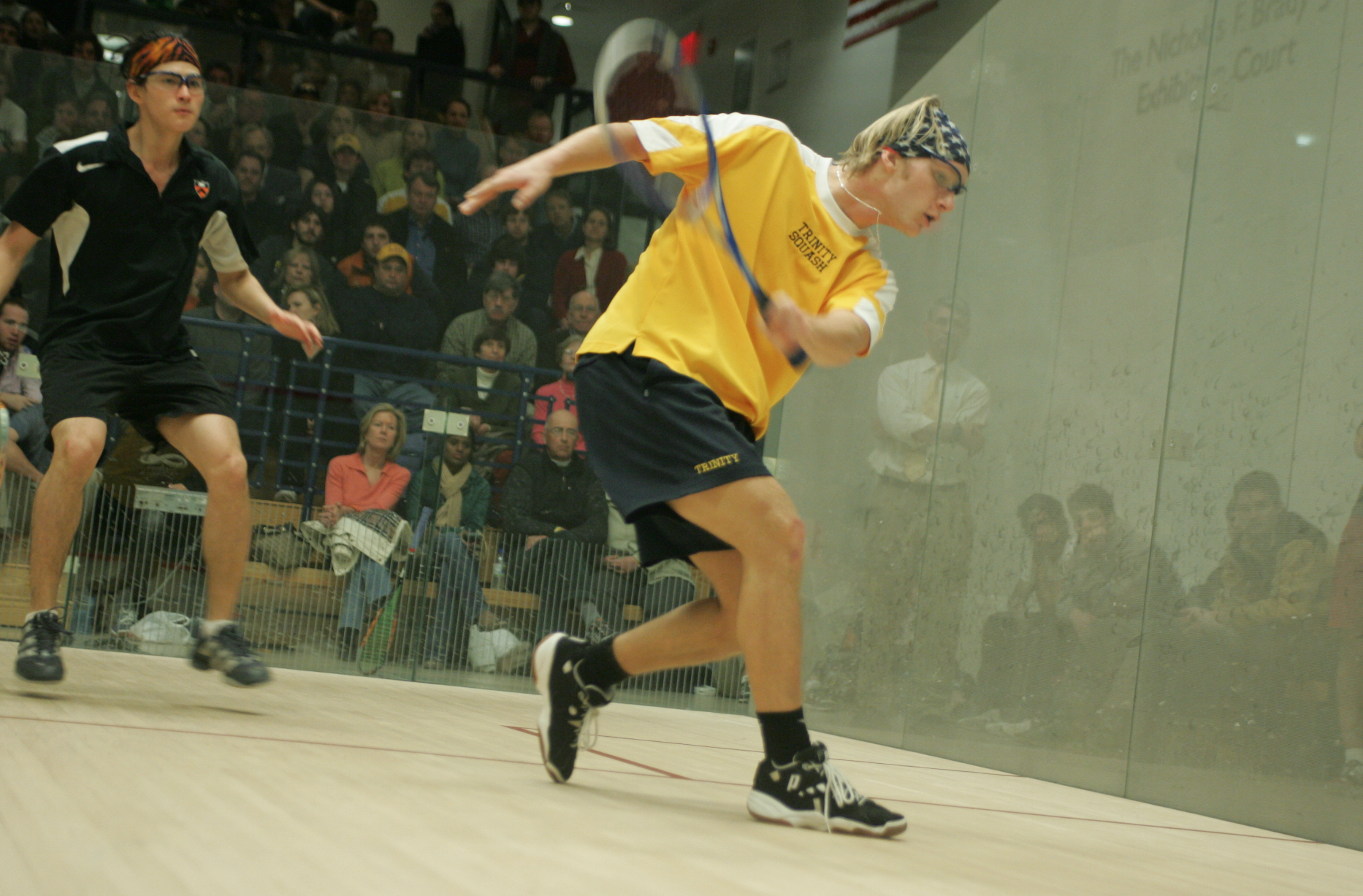
By Kirsten Carlson
Photos by Dale Walker/DaleWalkerPhoto.com
One amazing thing happened to each of the intercollegiate national championship teams this year. The first is more obvious, and definitely more well known. Trinity won their ninth consecutive national championship, on the heels of their ninth straight undefeated season, bringing their consecutive match wins total to a staggering 165. At the end of the season, Trinity left no doubt that it is still the best, and is the best; perhaps the best ever, in any collegiate sport.
They did face challenges this year. Like last year, they nearly lost a match, though they did not come quite as close as they did in the infamous Princeton match where then freshman, Gustav Detter, defeated the seemingly invincible Yasser El Halaby to save the streak. They were tested—strongly—by Harvard. Again they came out with a 5-4 win, with freshman Supreet Singh clinching the match with a 3-0 win over Niko Hardy at the No. 7 spot.
“We got completely ambushed there,” said Trinity head coach Paul Assaiante, just a couple of days after the February 7th match. “We got ambushed by a Harvard team that was up to the test. We got ambushed by a crowd that was vociferous. I’ve never seen anything like that. We were not prepared for what we found that night. A credit to the boys though; they hung in there to get the win. And the adage is, ‘a win is a win,’ but if we don’t learn from that match, we will not win at Nationals.”
Well, it appears the Trinity men learned their lesson, because when it came time for Nationals three weeks later, they dominated. A quick 9-0 win over Dartmouth in the first round, a slightly tougher 8-1 win over Yale in the semis, and then, for the first time in their current string of titles, Trinity won 9-0, over Ivy League Champions Princeton, who defeated Harvard 5-4 in the semis.

“It was pretty overwhelming in the sense that in all the times we have been to the finals, we have never won 9-0,” said Assaiante. “The boys played so well, so it was a bit of a lightning out of the bottle for them. Once the thing started, the momentum, you could just feel it. The horse had left the barn and there was no turning back.”
With a fairly young team and the loss of few, though strong, seniors (including Shaun Johnstone who often played No. 1), Trinity will once again be the team to catch next year.
So that is the men. An amazing story that gets more amazing each year. But what about the women champs? A completely different story with the end being the only thing the two have in common. The Princeton ladies won the dual match championship, the Howe Cup, and the Ivy title (okay, so it isn’t exactly the same ending since it is impossible for Trinity to win an Ivy title). But the similarity remains: a perfect season for both teams. The first title for Princeton since winning back-to-back Howe Cups in 1998 and 1999.
A title for the Princeton women looked like a strong possibility before the season even started. On paper, the only team that looked to be even with them in talent was Penn. Both had strong freshmen and a lot of depth. On January 31st, the match that both teams had been pointing towards and were expecting to be a nail biter, ended in a relatively easy win for Princeton, 7-2.
But as much as this season was about Princeton winning, it was what happened behind the scenes that defined the team. Claire Rein-Weston played No. 1 for Princeton for four years. When she was a freshman, her sister Annie was a senior and a captain on the team, something that made the transition for the Seattleite much easier. Claire had lots of success as a junior player, including a spot on the 2003 Junior Women’s World Team, and squash had for a long time, pretty much been her life. But last spring Claire was told she may have to give up squash—and possibly all forms of exercise. An abnormal EKG had doctors concerned about the possibility of Prolonged Long QT Syndrome, a rare heart problem that can cause athletes to suddenly die while exercising.
The next several months were filled with visits to the best cardiologists in the nation, with coach Gail Ramsay, where during the long car rides the coach and player got to be great friends. A trip home to a doctor in Seattle rounded out the quest for the best opinions, and after a summer spent in Spain, not knowing what her fate concerning squash would be, Claire finally found out.
“It was very scary knowing that I could lose squash forever in my life. I truly love squash,” Claire said. “And the prospect of not being able to play was awful. I certainly felt incredibly lucky when I ended up getting cleared to play a few days before I returned to Princeton for preseason.”

The doctors never came to a final conclusion about what was wrong with Claire’s heart–only that it was an abnormality of some sort—but they did rule out Long QT Syndrome and decided that playing squash would not endanger her health. With the clearance to play, Claire had a different attitude going into the season than she had in any of her first three years. After finishing third at Howe Cup in 2004, and fourth in 2005 and 2006, she realized that this year the team had a legitimate chance to win it all.
“I think we knew that this year we could do it and that we were capable of it,” she said. “Going into this season we had a specific goal in mind.”
Senior Ali Pearson—who had an exceptional season at the No. 5 position—and the rest of the upperclassmen worked well with the talented freshmen, with the result being a team with not only talent and experience, but also chemistry.
“We were very serious on court and everyone was pushing each other on,” said freshman Amanda Siebert. “When we were playing challenge matches, we were competitive because we wanted to win. But when we got off court we were friends. And it’s good that everyone was so competitive because it just made everyone that much stronger.”
At the beginning of the season, a big question was who would play No. 1. Canada’s Neha Kumar was the current US Junior Open U19 Champion, and was very much in the running for the top spot. But Rein-Weston managed to hold onto the No. 1 position, making her season that looked like it might never be, that much better.
“Every match, I felt so fortunate to be out there,” she said. “It was a dream season, and it literally couldn’t get any better than that for a senior.”





